Seafood wine pairing
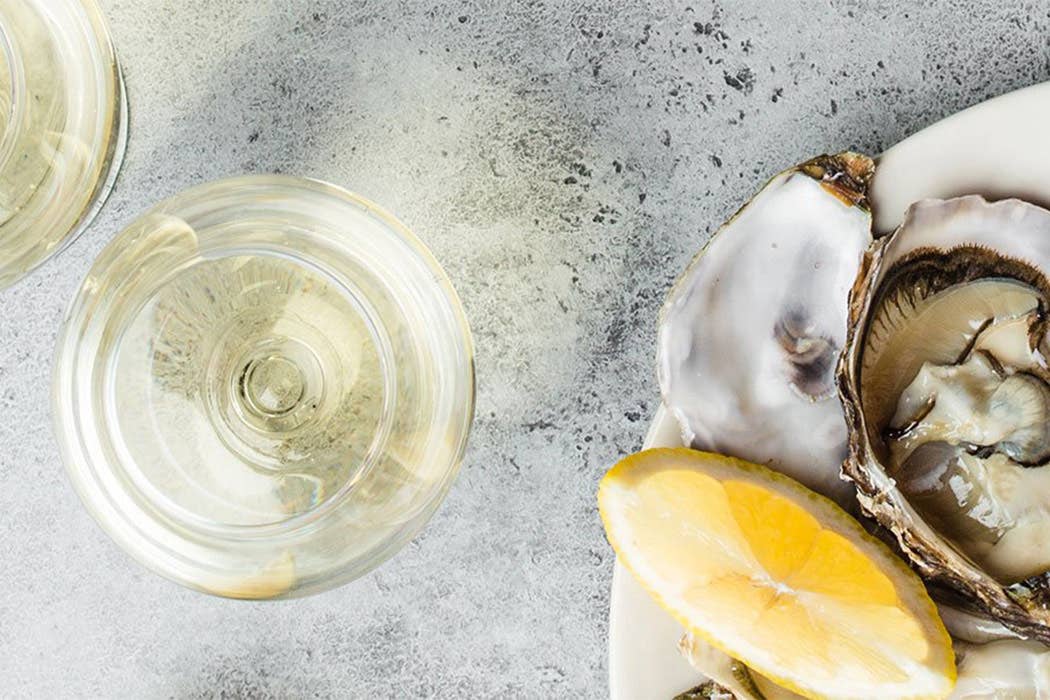
For as long as wine has been around, people have been experimenting with food and wine pairings. You may even have heard of the very general rule, “white wine with white meat, and red wine with red meat.” There are exceptions to every rule, but this will serve you well if you’re deciding whether to open a bottle of Sauvignon Blanc or Merlot with your chicken caesar salad.
But, what kind of wine should you pair with fish? If you have a chat with one of our fishmongers at your local New World, they’ll tell you about the wide variety of flavours within seafood, and how different fish should be cooked to bring out their unique flavours.
With that in mind, our guide for pairing wine and seafood will look at a variety of delicious fish and shellfish, and help you find a wine that perfectly complements your meal.
Before getting into specifics, here are some suggestions to follow that will help you choose the best wine to go with seafood and fish.
Dry, crisp wines like Pinot Gris or Sauvignon Blanc will complement lean fish like flounder, snapper or raw oysters. Alternatively, if you have a fattier fish like lobster or mussels, or perhaps a heavier cream sauce, these drier crisp white wines can provide some balancing acidity that cuts through.
Try a full bodied wine with a full bodied fish. A buttery, oaked chardonnay will stand up to the richness of a seafood chowder, crab or lobster. A light bodied red wine like Pinot Noir or Sangiovese will do well with salmon, tuna or bluefish.
Fruity, sweeter wines are great with Asian seafood dishes or anything spicy. A spicy shrimp curry, or this chilli crab recipe will go beautifully with a Riesling or Gewürztraminer.
Red or white wine with fish?
‘Fish’ is such a broad category of food, containing a wide variety of textures and flavours. Trying to choose just one to cover all seafood dishes simply won’t do justice to either the fish or the wine.
The better questions to ask are, ‘Which wine will pair best with this fish?’ or ‘I love this bottle of wine, what kind of fish should I put on the menu?’
Once you know which types of fish you enjoy, and understand the flavours they bring to a dish, you can start experimenting with different wine varietals until you find a perfect match.
Salmon wine pairing
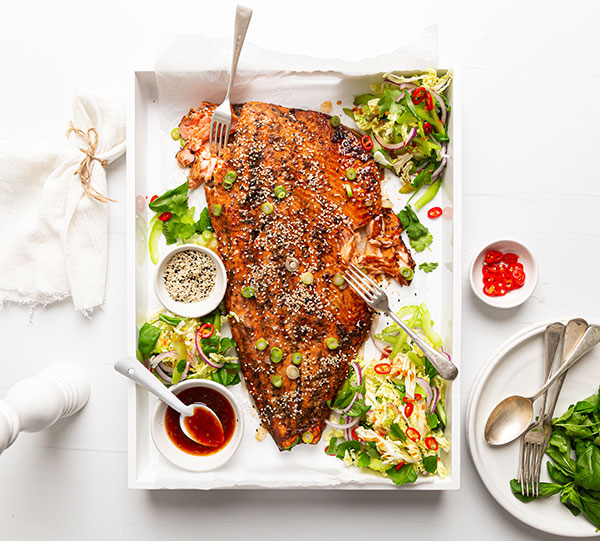
Salmon is a heartier fish, packed full of those good Omega 3 fats. It’s refreshing, subtle, and not a particularly ‘fishy’ flavoured fish.Smoked salmon has a slightly smoky flavour, with a deliciously smooth and silky texture. This fish is easily overcooked, so if you’re oven roasting or pan-frying to get that wonderful crispy skin, be sure to take it off the heat while it’s still sweet and juicy.A lighter red wine like Pinot Noir is a wonderful accompaniment for salmon. It’s fruity and assertive enough to withstand the thicker, oilier flavours, but not overly tannic or abrasive enough to over the fish.
For a decadent meal in, try this recipe for roasted salmon with a herb shallot and butter sauce. The end result is a rich, flaky roast salmon with a thick buttery sauce. An ideal wine to cut through with fresh crispness and bright fruity flavours is a dry rosé. Delicious!
For a much lighter, summery meal, try this gluten free pasta salad with asparagus and salmon. While the recipe calls for dried, flaked salmon, you could also substitute finely sliced smoked salmon. With plenty of sweeter tomatoes plus orange and yellow capsicum, a blush rosé would be right at home and complete the summer picture. You could also opt for a vibrant Sauvignon Blanc.
Salmon is used in a lot of Japanese cuisine, and this recipe for salmon and soba noodles with ginger and sesame dressing is a fantastic example. The dressing is sweet, spicy and salty including ingredients like fresh ginger, soy sauce, sesame oil, fish sauce, honey and apple cider vinegar. Each of those ingredients has the potential to overpower the others, and yet in balance they harmonise together and sing.
To pair a wine with this dish, you need one that will add its voice to the chorus and not push the others aside to take centre stage. Try matching with a drier Pinot Gris or this Seifried Gewurztraminer. There’s enough sweetness, fruit and acid to ensure the fish and the wine remain in balance.
Swordfish wine pairing
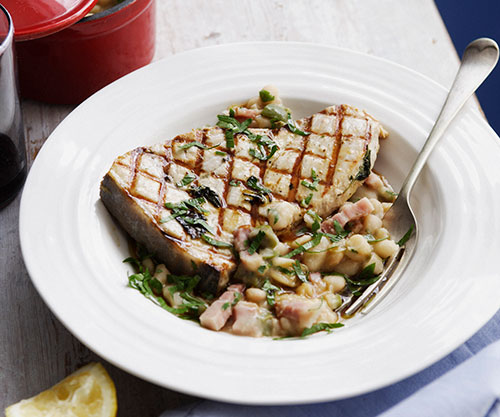
Another great option for people who don’t like a strong ‘fishy’ flavour or aroma. Swordfish has a meaty consistency, so is often barbecued on a kebab or grilled and served as a steak.Unlike salmon, which is full of good Omega 3 fats, swordfish is rather lean, and low in both fat and calories. The texture and consistency of swordfish is similar to other ‘meaty’ fish like tuna or halibut.If you’re eating swordfish, you need a medium or full-bodied white wine that will draw out the unique flavours of the fish without getting lost. An oaked Chardonnay or one with citrus notes is a common pairing with swordfish, especially if the swordfish has been roasted with lemon slices or served with a fruit based glaze.
For swordfish cooked in a tomato or a creamy sauce, an acidic dry Rosé or a medium bodied Pinot Noir can complement meaty swordfish, pleasantly cutting through the heavier elements of the meal.
Try to avoid sweet Rosé varieties or heavier red wines as the fruitiness can feel over-the-top and end up overpowering the flavours you’re looking for in your swordfish.
Cod wine pairing
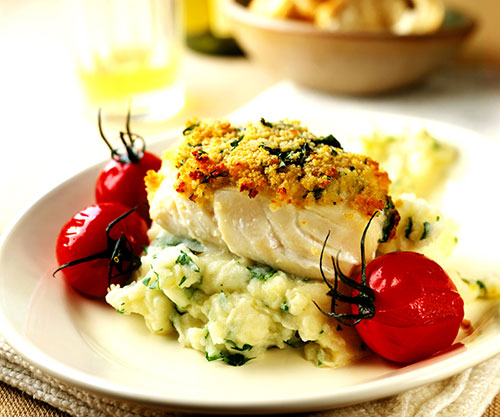
Cod is an incredibly versatile fish and can be cooked in any number of ways. It’s also common in New Zealand, so you can be sure of a steady supply of blue cod from your local New World all year round.Part of blue cod’s versatility comes from it’s mild flavour and delicate texture. Whether your recipe calls for fish that’s smoked, fried, baked, steamed, or used in a soup or chowder, blue cod is a good choice.While cod is categorised as a flaky white fish, it has bigger flakes and a more robust texture than lighter fish like plaice or sole. An easy wine to drink with cod is a lighter white wine like Pinot Gris, Riesling or Sauvignon Blanc.
For a robust, creamier recipe, like this creamy blue cod pie recipe try an unoaked Chardonnay, or a drier Sauvignon Blanc with a high natural acidity.
Roasting or grilling cod with lemon and herbs? Dill, tarragon, parsley, chives and lemongrass all work wonderfully with cod. Try a zesty New Zealand Sauvignon Blanc, which are famous for having their own herbal notes.
Saltier cod dishes can make sweet wines taste a bit sweeter. If you’re frying cod in batter, look for a dry Pinot Gris or Rosé. Even better if you can find sparkling variety, or a dry bubbly Gewürztraminer. These wines have enough acidity to counter the fattiness, but not too many robust fruity flavours to overpower the fish.
What wine goes with bluefish?
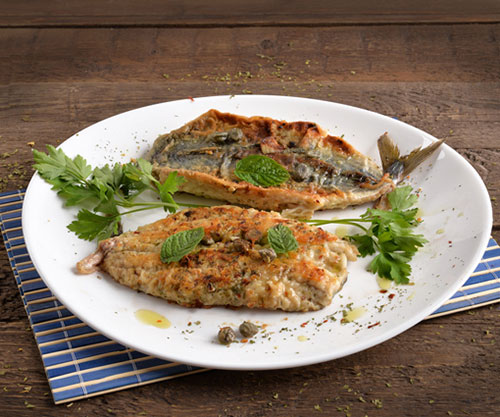
The imaginatively named Bluefish, sometimes known as Tailor are strong muscled swimmers that can put up a fight with keen fishers. It’s the muscle that gives Bluefish it’s distinctively rich, oily flavour. Bluefish is best eaten fresh, and because it has a soft texture, so take care when cooking and handling. Bluefish has a bit of a reputation, because they can develop quite a fishy, gamey flavour if they are not eaten after three or four days. The high oil content of Bluefish makes it ideal for grilling, barbecuing or baking. If you’re thinking of Bluefish for dinner, head to the herbs and spice aisle of your local New World for oregano, basil and thyme, as well as fresh tomato, lemon and fennel with a drizzle of balsamic vinegar.
Like swordfish, bluefish is also full-flavoured and meaty, which means a light red wine can compliment it’s natural flavours. Think Pinot Noir or even a Gamay.
If you’re preparing your bluefish with more of the citrus and spices in mind, a grassy Sauvignon Blanc will help to bring out the flavours in the seasoning.
Best wine for mussels
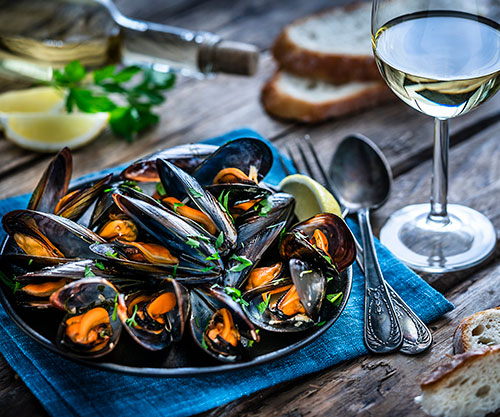
New Zealanders love mussels. You can find them all over our beautiful country, and they don’t need too much cooking or preparation to create a dish that’s packed with flavour. Mussels are meaty and salty. The wine you choose should accentuate these flavours.Want to enjoy fresh steamed mussels? This recipe calls for half a bottle of white wine to infuse with the mussels as they steam and open. For this recipe especially, you want a delicate wine that will elevate the flavour of the mussels and allow them to be the star. A dry Pinot Gris or Gewurztraminer is a perfect match adding a delicate aroma while still allowing the unique mussel flavours to come through. Another possibility is this Mount Riley Sauvignon Blanc, with lovely passionfruit and grapefruit flavours to balance out the acidity.
In this simple recipe for mussels with tomatoes and garlic, a crisp, zingy Sauvignon Blanc can reach into the bowl and draw out the mineral flavours of the mussels.
This Fijian Baked Lolo Mussels recipe calls for lightly steamed mussels to be finely chopped, slathered with coconut cream and a hint of lemon before being baked in a half shell until lightly browned. For a wine accompaniment, you want a balanced white with citrus and acidity like this Mud House Sauvignon Blanc. It has an elegance that doesn’t get caught in the coconut cream while enhancing the mussels and lemon seasoning.
On their own or in a sandwich, this recipe for mussel fritters is sure to become your new favourite. A light batter with lemon, dill, coriander and just a little sweet chili sauce and you have a wonderful breakfast or late night snack all ready to go. These mussel fritters go wonderfully with a Wither Hills Pinot Gris, or even the Wither Hills Chardonnay. Both have a citrusy sweetness and versatility that enhance the seafood flavours. Chardonnay may not be the obvious choice for mussels, but this unoaked With Hills Chardonnay has the right amount of lemon, pineapple and vanilla to accompany mussel fritters without overpowering.
If you love Spanish cuisine you simply must try this recipe for Prawn, Chorizo and Mussel Paella. A red, spicy meal gives you more grace to opt for a medium bodied red wine, or a full bodied white. A powerful oaked Chardonnay will bring enough flavour to the table that it’s not lost among the paprika and spicy chorizo. You could also try a young, fruity red wine like this Running With Bulls Tempranillo, that will work to tone down some of the spicier elements.
Wine pairing with shrimp
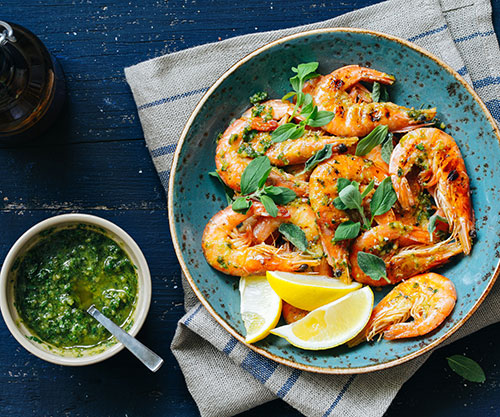
Prawns are delicious cooked in butter and garlic, and garlic loves Sauvignon Blanc. Its zesty citrusy notes are a perfect accompaniment to a summer barbecue and garlic prawns on a skewer.Want to avoid the garlic and just enjoy the flavours of a deliciously cooked shrimp or prawn? A crisp, sparkling, minerally white wine like Pinot Grigio is ideal. You almost want your wine to act like a squeeze of lemon that respects the flavours of the shrimp. A crisp Rosé, still or sparkling, or even a Prosecco will each emphasise something different. Within the world of curry, seafood is often overlooked and especially shrimp because of it’s delicate flavours. That being said, with this easy to cook spicy shrimp curry recipe you’ll know you’re onto a winner. Spicier dishes love wine that is a little sweet and fruity. Try the spicy shrimp curry with this Mount Riley Marlborough Riesling. It’s zesty, fruity, and wonderfully balanced.
Crab & lobster wine pairing
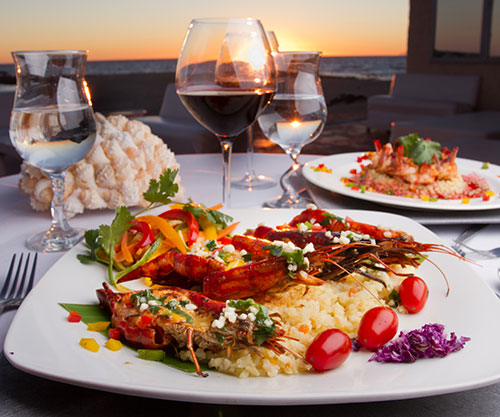
With its delicate flavours and soft white meat, lobster and crab need a light, fresh wine companion. Think about how good fresh lobster tastes with just a squeeze of lemon over the top? You want a light, crisp wine with a touch of acidity to act as the lemon wedge to your lobster or crab dish.How are you cooking your lobster? As with all delicate seafood dishes, finding the right wine depends on the overall flavours of the meal.Cooking buttered lobster in the shell, smothered in garlic butter, with a buttered bruschetta? A big buttery Chardonnay like this varietal from Te Pa Chardonnay will add texture as well as richness to your meal.
Lobster in a light sauce, or straight from the shell with seasoning that heroes the flavours of the seafood deserves a light, slightly crisp wine to add balance and a touch of acidity. Sauvignon Blanc is a good choice: try these delicious varieties from Squawking Magpie Reserve or Two Rivers Convergence.
Crab are not always in season and not always available from your local New World. With this Singapore chilli crab recipe, you can substitute the crab for fresh New Zealand crayfish for a local spin on this flavourful dish. When matching wine with a more intense dish like a curry, your focus should be more on the overall flavours of the meal. In addition to crab or crayfish, this curry contains lime juice, ginger, garlic, chilli and coriander. All big flavours that harmonise with each other. You’ll want a wine that has enough sweetness to counteract the chilli, as well as texture and zesty flavours that will keep the rest of the dish balanced. Try this Villa Maria Cellar Selection Riesling, which the judges in the New World Wine Awards 2020 found to be very food friendly, complementing Asian seafood dishes especially.
Crab cakes wine pairing
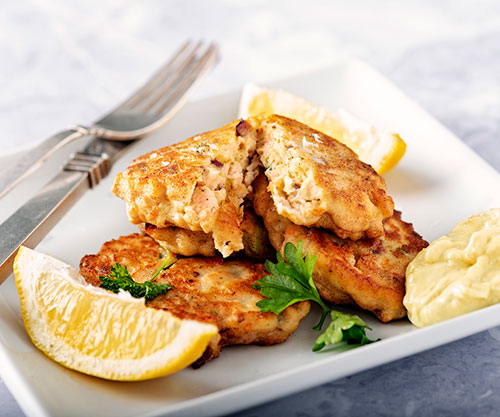
While crabmeat is light and sweet, there are so many recipes available for crab cakes to suit everyone’s palette. If the natural flavour of crab is the hero of the dish, a light, crisp, slightly acidic white wine like a Sauvignon Blanc is a great place to start, but what’s in your crab cake recipe?Coated in breadcrumbs, fried in oil and served with a mayo sauce? A light, sparkling wine with your crab cakes is what you need to cut through those heavier elements. The green apple acidity in this Morton Estate Premium Brut can provide the balance your fried crab cakes need. Are your crab cakes packed with herbs or served with fruity dipping sauces? There’s a wonderful world of flavours within New Zealand Sauvignon Blanc for you to explore. This varietal is grown in cooler climates like Canterbury or Central Otago tends to have more of the herbaceous, grassy flavours to pair with a similar styled crab cake. For those fruity dipping sauces, look for a Sauv from a warmer region like Nelson or Hawkes Bay that will bring their own tropical fruit flavours.
Scallops wine pairing
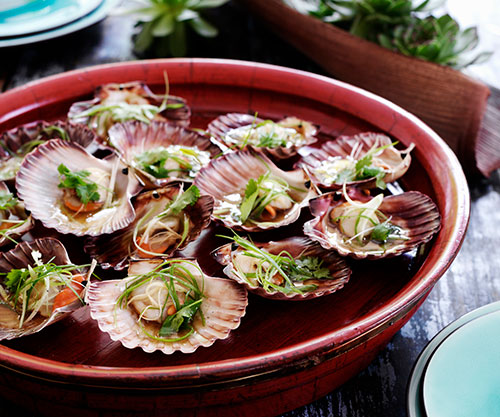
Perfectly seared scallops can be delicately delicious and simply melt in your mouth. If you’re unfamiliar with scallops, they have a similar flavour to lobster and crab but with a slightly firmer texture. Scallops are not overly ‘fishy’ but do carry a slightly briny essence that reminds you they are from the sea.Because scallops will easily absorb the other flavours you’re cooking with, choosing a good white wine to pair with will depend on how you’re preparing them.Love scallops and want to hero their natural flavour? Marinating them and serving scallop ceviche or even raw in the shell can be delicious. You want a dry white wine to act as the lemon wedge squeezed over the top, with just enough fruit, acidity and minerality to emphasise the mild scallop flavours. A Pinot Gris or Riesling from the dry end of the spectrum can be aromatic and delicate enough to highlight your scallop ceviche without being overpowering.
Seared scallops in butter can create delicious caramelised flavours that pair well with a slightly more complex white wine. This Alpha Domus Sauvignon Blanc has a creamy complexity that complements a seared scallop.
Need more inspiration?
With some of the freshest seafood available, and best wines in the world, you are sure to have plenty of success refining your wine and seafood pairings.
If you’re preparing for a wine and cheese night, have a look at our wine and cheese pairing guide. Or use our wine finder tool to see the top drops under $25 that have impressed our judges at the New Zealand Wine Awards.